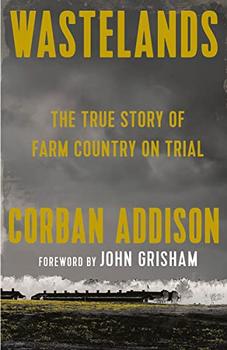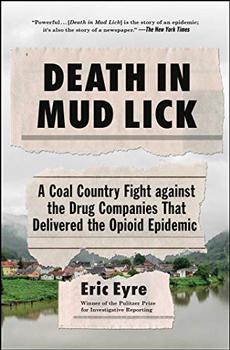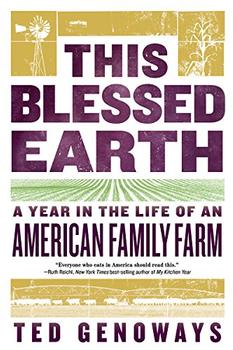Summary | Excerpt | Reviews | Beyond the book | Read-Alikes | Genres & Themes | Author Bio

The True Story of Farm Country on Trial
by Corban AddisonGrowing up in eastern North Carolina in the 1950s, Elsie Herring reveled in the rustic beauty of the surrounding countryside—a pine-fringed sweep of plains dotted with small farms. But when she returned in the early 1990s after several decades away, Elsie found her childhood home transformed. A noxious stench in the air made sitting outside unbearable. Flies swarmed the yard, and buzzards circled overhead. Noisy trucks screeched by at all hours of the day and night, shattering the peace. Worse yet, a foul spray would periodically rain down on her house—liquefied hog waste from the concentrated animal feeding operation, or CAFO, that had been established on neighboring land in her absence.
Large-scale hog farms like the one next door to Elsie began proliferating across eastern North Carolina in the 1980s as lax regulations and industrialized farming methods gave rise to a corporate model of agriculture (see Beyond the Book). As big agribusinesses consolidated their hold on the market, thousands of small, independent farmers were squeezed out of business. And residents like Elsie were forced to put up with intolerable levels of air and water pollution in their backyard, disruptions to their quality of life, and harms to their health and well-being.
Wastelands tells the story of the protracted struggle of Elsie and hundreds of other residents in her community to fight back and force factory farms to clean up their act. When years of activism led nowhere, community members finally took their case to court in 2013, prompting a high-stakes legal battle that dragged on for five years, pitting the plaintiffs and their legal team against powerful moneyed interests, the pork industry's slick propaganda machine, a corporate intimidation campaign and a political system rigged against them.
It's a story that internationally best-selling author Corban Addison is particularly well-equipped to tell. A former attorney with litigation experience, Addison deftly narrates dramatic courtroom showdowns, leading us through the ins and outs of the legal proceedings in five separate class action suits filed against the hog industry's biggest offender: Smithfield Foods, a 15-billion-dollar multinational corporation that controls more than a quarter of the United States market for pork.
Of North Carolina's roughly 10 million commercial hogs, a majority are raised on massive factory farms with as many as 60,000 animals in a herd. Most of these farms are operated by contract growers hired by Smithfield, and most are located in predominantly low-income communities of color in eastern North Carolina, where hogs outnumber humans 35 to one. In Duplin County, Elsie's part of the state, more than 20% of residents live within half a mile of a CAFO—and the staggering amounts of waste these industrial farms produce.
The average hog generates three to ten times the amount of feces and urine as a human. Collectively, the hog farms in four counties in eastern North Carolina produce an amount of waste equivalent to a city twice the size of New York. Yet instead of investing in treatment facilities and odor control systems for all this waste—technologies the multi-billion-dollar corporate giant deems too costly to implement—Smithfield uses a crude system of cesspools.
Hog feces and urine are pumped into enormous open-air, unlined pools referred to as "lagoons" that emit overpowering odors and befoul the air with methane and other polluting gases. When the lagoons become full, the wastewater is sprayed on surrounding fields, releasing a fetid, bacteria-laden mist that seeps into the waterways and drizzles down on everything within range—including, in the case of the community in Wastelands, the plaintiffs' houses.
Represented by a hot-shot team of lawyers—one of them local legal superstar Mona Lisa Wallace, who has spent her 30-year career prosecuting corporate malfeasance—more than 500 residents living within a mile and a half of a CAFO joined the lawsuits, charging Smithfield with violating their right to enjoy their property without interference from a neighbor.
Drawing on hundreds of hours of interviews, months of on-the-ground research and meticulous documentation from court records, media reports and other written sources, Addison brings the trials to life in immersive detail, weaving the personal backstories of the plaintiffs, witnesses and lawyers into a sweeping account of North Carolina's hog industry and the repercussions of the Smithfield verdicts for Big Agriculture in general.
Wastelands is a powerful indictment of the dysfunctions of our industrialized food system and its damaging effects on the environment and on human health. It is also a great read.
Addison's four previous books are novels informed by true events, fictionalized accounts of real-life issues such as human trafficking and sweatshop labor in the fashion industry. In Wastelands—his first work of narrative non-fiction—he flips the script, taking a true story and recounting it in the style of a novel. With its page-turning pace, full cast of vividly rendered characters and adept use of dialogue, the book reads like a legal thriller, an epic underdog tale that brims with conflict and drama—and concludes with a storybook ending that seems too good to be true but is.
![]() This review was originally published in The BookBrowse Review in July 2022, and has been updated for the
October 2023 edition.
Click here to go to this issue.
This review was originally published in The BookBrowse Review in July 2022, and has been updated for the
October 2023 edition.
Click here to go to this issue.

If you liked Wastelands, try these:

by Eric Eyre
Published 2021
From a Pulitzer Prize–winning reporter from the smallest newspaper ever to win the prize in the investigative reporting category, an urgent, riveting, and heartbreaking investigation into the corporate greed that pumped millions of pain pills into small Appalachian towns, decimating communities.

by Ted Genoways
Published 2018
Is there still a place for the farm in today's America?
Your guide toexceptional books
BookBrowse seeks out and recommends the best in contemporary fiction and nonfiction—books that not only engage and entertain but also deepen our understanding of ourselves and the world around us.